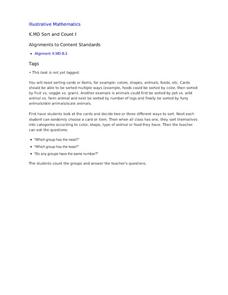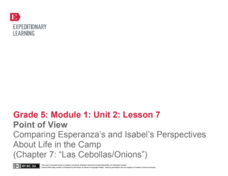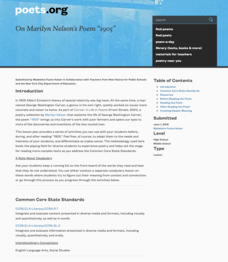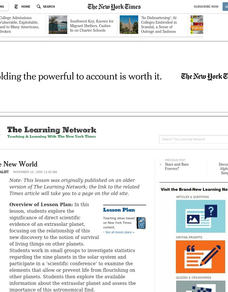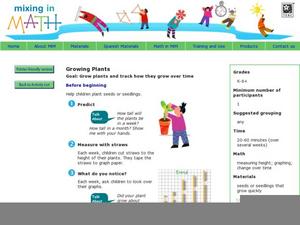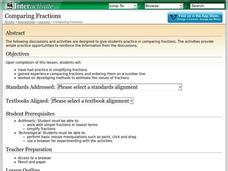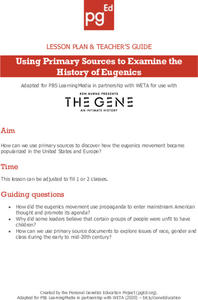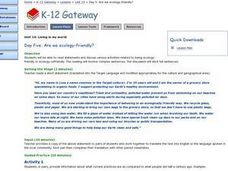Illustrative Mathematics
Sort and Count
Young mathematicians are on their feet and moving around in this primary grade sorting activity. After giving each child an object or picture card, they then sort themselves into groups, counting to see which has the most or least...
Curated OER
Investigation--Comparing and Ordering Fractions
Fourth graders use fraction strips to compare and order fractions. Identify various ways a figure can be divided. Find equivalent fractions. Recognize and order fractions with the denominators 2,3,4,5,6,8,10, and 12.
Alabama Learning Exchange
Comparing Fuel Economy
Compute fuel economy and gas mileage. Why? So you can teach rates and ratios, of course! Middle schoolers calculate the rate of miles per gallon for various vehicles. They research each vehicle, its mileage per gallon, and cost per...
EngageNY
Point of View: Comparing Esperanza's and Isabel's Perspectives About Life in the Camp (Chapter 7: "Las Cebollas/Onions")
Explore point of view and more with a Common Core-designed instructional activity. Learners experience different points of view by representing one of two characters from Esperanza Rising during a partner discussion. They must use...
EngageNY
Grade 5 Math Module 1, Topic F, Lesson 13
After completing a fluency practice set on subtracting, multiplying, and comparing decimals, pupils begin learning about dividing decimals by whole numbers. They see how to use place value reasoning to find compatible numbers for...
PBS
Decoding Media Bias
Alternative facts? After watching the We The Voters film, "MediOcracy," viewers compare how cable news outlets CNN, Fox News, and MSNBC report the same story about politics or public policy. After a whole-class discussion of their...
Academy of American Poets
On Marilyn Nelson's Poem “1905”
Marilyn Nelson's poem, "1905," asks young scholars to compare and contrast George Washington Carver and Albert Einstein. After studying images of the two scientists and listing their observations, class members listen to several readings...
ReadWriteThink
What is Poetry? Contrasting Poetry and Prose
Introduce middle schoolers to the different strategies used when reading prose versus poetry. Groups use a Venn diagram and a poetry analysis handout to compare the characteristics of an informational text and a poem on the same...
National Endowment for the Humanities
"Sí, se puede!": Chávez, Huerta, and the UFW
"Sí, se puede!" Cesar Chavez and Dolores Huerta believed organizing farm workers and changing their working conditions were possible. Scholars examine provisions of the Bracero Program, videos, and the United Farm Workers' (UFW) work....
Curated OER
Measurement and Conversion of Units in a Recipe
In a cross-curricular measurement and literacy lesson, your class will identify and compare cooking measurement instruments. They read a recipe and sequence a set of similar instructions in which the steps have been mixed up....
Pace University
Urban Communities
Urban communities are the focus of a series of lessons created to meet specific needs using differentiated instruction. A pre-assessment designates scholars into three groups based on their ability level. Small groups take part in...
ReadWriteThink
Captioning the Civil Rights Movement: Reading the Images, Writing the Words
Scholars boost their knowledge of the Civil Rights Movement with a lesson that challenges writers, readers, and historians to analyze primary sources and caption their observations. By way of reading, writing, discussion, independently,...
Nebraska Department of Education
Work: Love It or Hate It?
Future job seekers interview adults who love their work and ones that dislike their work. After reflecting on what they learned in a whole-class discussion, participants create a mission statement that details what they want and don't...
Curated OER
A Whole New World
Students work in small groups to investigate statistics regarding the solar system and participate in a 'scientific conference'. They explore available information about the extrasolar planet and assess the importance of this...
National Math + Science Initative
Introduction to Decimals
Three activities make up an introductory lesson designed to create a strong foundation in comparing fractions to decimals and exploring and building decimal models. Pupils brainstorm and complete a Venn diagram to show how decimals and...
Mixing In Math
Mixing in Math: Growing Plants
Whether you have your class plant seeds or begin when sprouts are visible, math skills are used here to predict and track growth over time. Straw bar graphs show plant height on a given day while the graph as a whole shows changes over...
Southern Nevada Regional Professional Development Program
Reading Literature - An Occurrence at Owl Creek Bridge
“An Occurrence at Owl Creek Bridge,” Ambrose Bierce’s short story, is used to model how structural moves, the decisions an author makes about setting, point of view, time order, etc., can be examined to reveal an author’s purpose. Groups...
Curated OER
Comparing Fractions
Students discuss the nature of fractions and compare fractions based on a similar whole to determine relative size.
Arizona Department of Education
Introduction to Integers
Welcome to the backward world of negative numbers. This introductory lesson teaches young mathematicians that negative numbers are simply the opposite of positive numbers as they use number lines to plot and compare...
EngageNY
Grade 5 Math Module 1, Topic E, Lesson 12
Continuing from the previous instructional activity, scholars work on mastering the skill of multiplying decimal fractions by a whole number. The method employed in the instructional activity is to convert the decimal fraction to its...
Scholastic
Dear Miss Breed
This compelling plan based on the letters in the book Dear Miss Breed engages readers in learning what it was like for Japanese Americans following the attacks at Pearl Harbor. After reading the letters, young scholars will...
Personal Genetics Education Project
Using Primary Sources to Examine the History of Eugenics
Eugenics philosophy takes survival of the fittest to a whole new level. With a research-focused lesson, young scientists examine the history of the eugenics movement and its impact on society. Pupils engage with a video clip, primary...
Curated OER
Introduction to Equivalent Fractions
Explore equivalent fractions! Youngters measure the crown of their head with adding tape labeled with various fractions and fractional parts, and compare strips to notice numerical relationships. They fold adding tape in half and color...
Curated OER
Are We Ecology-Friendly?
Students explore ecology. In this ecology lesson, students read scenarios, discuss them in groups and decide if they are eco-friendly or not. Students discuss the differences in eco-friendly practices fifty years ago and now. Students...
